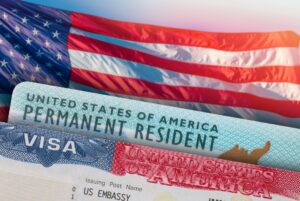At US-ILC, we listen, we care, we deliver: Let our 89 years of combined experience help you navigate the complexities of immigration law!
Since the Trump administration took office in January 2025, changes in immigration policies have been coming with such frequency that it can be challenging to keep up. One of the most controversial changes relates to certain aliens in the United States. In January, the administration issued an executive order directing the Department of Homeland Security to implement an alien registration policy that will affect millions of non-citizens living in or visiting the U.S.
What Is the Alien Registration Requirement?
The Alien Registration requirement was originally enacted in 1940 with the goal of Protecting the American People Against Invasion. When Trump’s administration took power in January, they successfully won the right to reinstate this Act, despite a lawsuit that attempted to claim the alien registration requirement was unconstitutional.
Who Needs To Register?
Non-citizens aged 14 and older who have been in the U.S. for at least 30 days were required to register with the federal government by April 11, 2025, if they hadn’t already submitted biometrics when applying for immigrant or nonimmigrant visas. Those entering the U.S. after that date are now required to register with the government within 30 days of arrival. For non-citizens who turned 14 after entering the US, they must register within 30 days of their birthdate.
The specific groups of noncitizens who must undergo alien registration have been broken down as follows:
Non-Citizens Who Entered Without Inspection
There are an estimated 2 to 3 million people who entered the U.S. through the border without inspection, and as such, they do not have legal status that would have helped them secure a work permit. These noncitizens were required to register – even if they have an approved I-130 petition filed by a US citizen or permanent resident spouse and have a pending Form I-601A waiver.
Canadian Visitors
Another group of noncitizens who are required to register are Canadians who crossed the border into the U.S. by car, and plan to remain here for more than 30 days. This is because Canadians do not need a visa to enter the U.S. as tourists.
Other Non-Citizens
Those noncitizens who applied for certain benefits that didn’t require biometrics at the time of filing, such as Temporary Protected Status, will also need to undergo the alien registration process and be fingerprinted.
The new policy does not apply to certain noncitizens who have already submitted biometrics as part of certain immigration processes. These include the following:
- Lawful Permanent Residents
- U.S. visa holders
- Noncitizens who entered as Parolees
- Noncitizens in removal proceedings
- Noncitizens with pending employment authorization applications
How Do You Register as an Alien?
If you are a noncitizen in the U.S. who hasn’t submitted biometrics to the government as part of an immigration process, you can register as an alien by following the steps below:
- Create an online account with USCIS
- Fill out and submit Form G-325R, Biometric Information, online
- Attend a biometrics appointment as required
After your biometrics have been processed, the USCIS will issue you a registration notice as proof of your registration. You will be required to always carry this notice wherever you go.
What Happens if You Do Not Register?
After the World Trade Center was attacked in 2001, the U.S. established a National Security Entry-Exit Registration System (NSEERS) that resulted in the detainment and deportation of many non-citizens who registered with the government as required. Because it is not yet known if this new alien registration policy will lead to the same results, many noncitizens may be tempted to avoid registration. However, if you are at least 18 years old and you do not register or attend a scheduled biometrics appointment, then you will be subject to the following criminal penalties:
- A fine of up to $5,000
- Misdemeanor prosecution
- Imprisonment of up to 6 months
- A fine of up to $5,000 plus imprisonment of up to 6 months
If you are a noncitizen who is concerned about the alien registration requirement, or if you have questions regarding another immigration matter, contact U.S. Immigration Law Counsel for a strategy session to discuss your case.




